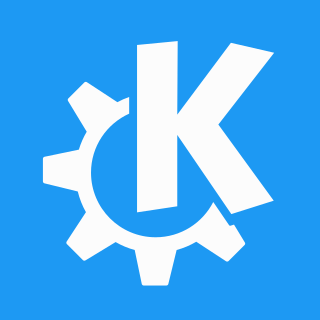
KDE is an international free software community that develops free and open-source software. As a central development hub, it provides tools and resources that enable collaborative work on its projects. Its products include the Plasma Desktop, KDE Frameworks, and a range of applications such as Kate, digiKam, and Krita. Many KDE applications are cross-platform and can run on Unix and Unix-like operating systems, Microsoft Windows, and Android. KDE is legally represented by KDE e.V. based in Germany, who also own the KDE trademarks and fund the project.
freedesktop.org (fd.o), formerly X Desktop Group (XDG), is a project to work on interoperability and shared base technology for free-software desktop environments for the X Window System (X11) and Wayland on Linux and other Unix-like operating systems. Although freedesktop.org produces specifications for interoperability, it is not a formal standards body.

Kontact is a personal information manager and groupware software suite developed by KDE. It supports calendars, contacts, notes, to-do lists, news, and email. It offers a number of inter-changeable graphical UIs all built on top of a common core.
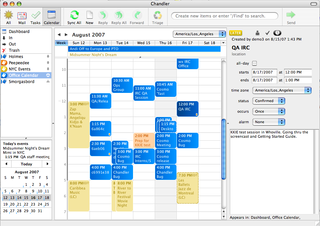
Chandler is a discontinued personal information management software suite described by its developers as a "Note-to-Self Organizer" designed for personal and small-group task management and calendaring. It is free software, previously released under the GNU General Public License, and now released under the Apache License 2.0. It is inspired by a PIM from the 1980s called Lotus Agenda, notable because of its "free-form" approach to information management. Lead developer of Agenda, Mitch Kapor, was also involved in the vision and management of Chandler.
Kolab is a free and open source groupware suite. It consists of the Kolab server and a wide variety of Kolab clients, including KDE PIM-Suite Kontact, Roundcube web frontend, Mozilla Thunderbird and Mozilla Lightning with SyncKolab extension and Microsoft Outlook with proprietary Kolab-Connector PlugIns.

KDE Software Compilation 4 was the only series of the so-called KDE Software Compilation, first released in January 2008. The final release was version 4.14.3 in November 2014. It was the follow-up to K Desktop Environment 3. Following KDE SC 4, the compilation was broken up into basic framework libraries, desktop environment, and applications, which are termed KDE Frameworks 5, KDE Plasma 5, and KDE Applications, respectively. Major releases (4.x) were released every six months, while minor bugfix releases (4.x.y) were released monthly.
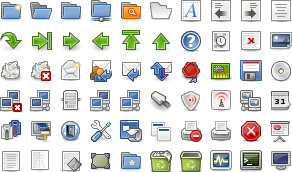
The Tango Desktop Project was an open-source initiative to create a set of design guidelines and to provide a consistent user experience for applications on desktop environments. The project created a set of icons known as the Tango Icon Library and that were described as a "proof of concept". The Tango Desktop Project was a project of freedesktop.org, and was closely linked with other freedesktop.org guidelines, such as the Standard Icon Theming Specification.
Pennsylvania Spatial Data Access (PASDA) is Pennsylvania's official public access geospatial information clearinghouse. PASDA serves as Pennsylvania's node on the National Spatial Data Infrastructure (NSDI). PASDA is a cooperative effort of the Pennsylvania Geospatial Technologies Office of the Office of Information Technology and the Pennsylvania State University Institute of Energy and the Environment.
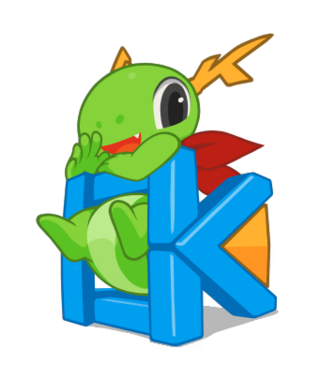
KDE Platform 4 was a collection of libraries and software frameworks by KDE that served as technological foundation for KDE Software Compilation 4 distributed under the GNU Lesser General Public License (LGPL). KDE Platform 4 was the successor to KDElibs and the predecessor of KDE Frameworks. KDE Platform 4 is the only version of KDE Platform, and in 2013 it was replaced by KDE Frameworks 5.
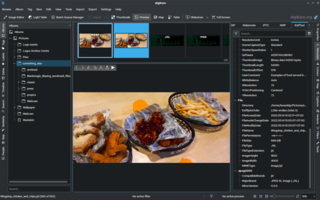
An image organizer or image management application is application software for organising digital images. It is a kind of desktop organizer software application.
In computer science, the semantic desktop is a collective term for ideas related to changing a computer's user interface and data handling capabilities so that data are more easily shared between different applications or tasks and so that data that once could not be automatically processed by a computer could be. It also encompasses some ideas about being able to share information automatically between different people. This concept is very much related to the Semantic Web, but is distinct insofar as its main concern is the personal use of information.

TinySPARQL is a file indexing and search framework for Linux and other Unix-like systems. It is written in the C programming language.
NEPOMUK is an open-source software specification that is concerned with the development of a social semantic desktop that enriches and interconnects data from different desktop applications using semantic metadata stored as RDF. Between 2006 and 2008 it was funded by a European Union research project of the same name that grouped together industrial and academic actors to develop various Semantic Desktop technologies.

K Desktop Environment 3 is the third series of releases of the K Desktop Environment. It was one of the two major desktop environments for GNU/Linux systems between 2002 and 2008. There are six major releases in this series. After the release of KDE 4, version 3.5 was forked into the Trinity Desktop Environment.

Windows Search is a content index and desktop search platform by Microsoft introduced in Windows Vista as a replacement for the previous Indexing Service of Windows 2000, Windows XP, and Windows Server 2003, designed to facilitate local and remote queries for files and non-file items in the Windows Shell and in compatible applications. It was developed after the postponement of WinFS and introduced to Windows several benefits of that platform.

The Open Collaboration Services (OCS) is an open and vendor-independent REST and WebDAV based API designed to make it easy to connect apps to a content collaboration platform.
Mailody is an e-mail client for the KDE Platform by Tom Albers.
OpenRaster is a file format proposed for the common exchange of layered images between raster graphics editors. It is meant as a replacement for later versions of the Adobe PSD format. OpenRaster is still in development and so far is supported by a few programs. The default file extension for OpenRaster files is ".ora".

The KDE Gear is a set of applications and supporting libraries that are developed by the KDE community, primarily used on Linux-based operating systems but mostly multiplatform, and released on a common release schedule.










